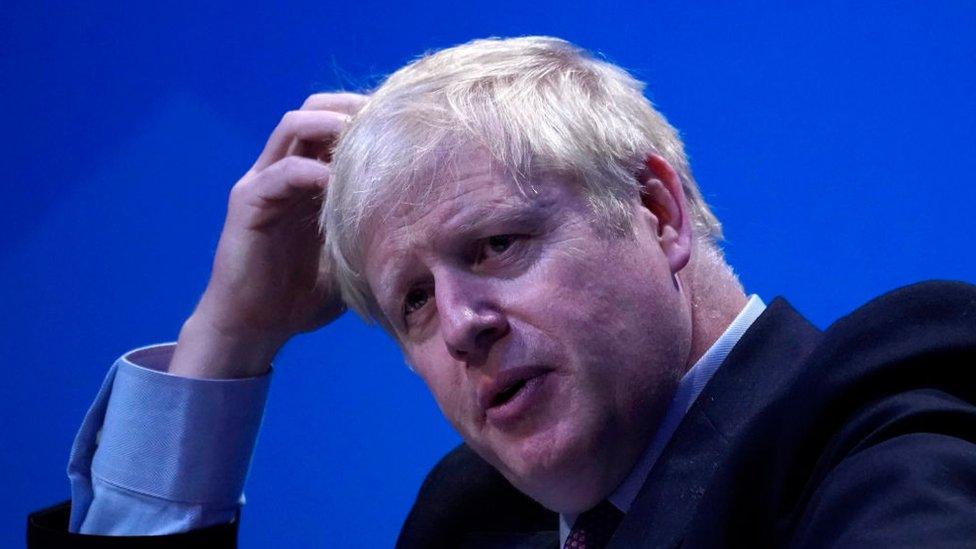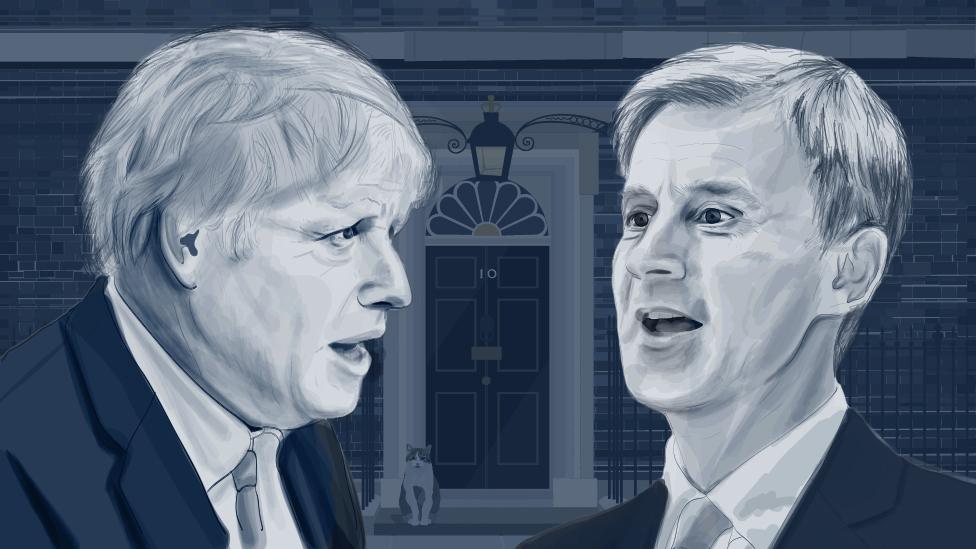Johnson defends Brexit plan and 'row' silence
- Published
Boris Johnson on Brexit, privacy and his character
Boris Johnson has admitted he would need EU co-operation to avoid a hard Irish border or the possibility of crippling tariffs on trade in the event of a no-deal Brexit.
In an exclusive interview with the BBC, the favourite to be the next PM said: "It's not just up to us."
But he said he did "not believe for a moment" the UK would leave without a deal, although he was willing to do so.
Asked about a row he'd had with his partner, he said it was "simply unfair" to involve "loved ones" in the debate.
Reports of the argument on Friday with his girlfriend, Carrie Symonds, dominated headlines over the weekend after the police were called to their address in London.
The interview comes after Sky News said it would have to cancel a head-to-head debate on Tuesday between the two leadership contenders as Mr Johnson had "so far declined" to take part.
Work and Pensions Secretary Amber Rudd told Radio 4's Today programme she found Mr Johnson's decision to ignore live TV debates "very odd" and urged him "to reconsider".
Following days of criticism that he has been avoiding media scrutiny, Mr Johnson has given a number of other interviews, including with LBC and Talk Radio.
On LBC, he was repeatedly challenged on his personal life and a photograph which showed him and his partner. Asked whether his campaign was behind the release of the picture, Mr Johnson refused to answer.
He told Talk Radio's political editor Ross Kempsell he would "not rest" until the UK had left the EU, insisting Brexit would happen on 31 October "come what may... do or die".
Meanwhile, the other candidate, Jeremy Hunt has promised to boost defence spending by £15bn over the next five years if he becomes prime minister.
'Different understanding'
In his interview with BBC political editor Laura Kuenssberg, Mr Johnson said the existing deal negotiated by Theresa May "is dead".
He insisted it was possible to broker a new deal with the EU before the end of October because the political landscape had changed in the UK and on the continent.
"I think actually that politics has changed so much since 29 March," he said, referring to the original Brexit deadline.
"I think on both sides of the Channel there's a really different understanding of what is needed."
At the moment, the UK is due to leave the EU on 31 October after the PM's Brexit deal was rejected three times by Parliament, and the EU has previously said the withdrawal agreement reached with the UK cannot be reopened.
Mr Johnson said he would be able to persuade Brussels to resolve the Irish border issue - a key sticking point - despite repeated warnings from EU leaders that that was impossible.
He said there were "abundant, abundant technical fixes" that could be made to avoid border checks.
When challenged that these did not exist yet, Mr Johnson replied: "Well, they do actually... in very large measure they do, you have trusted trader schemes, all sorts of schemes that you could put into place."
But, he admitted, there was "no single magic bullet" to solve the issue.


A plan full of ifs and buts
Mr Johnson's really controversial gamble is to say he could do a new trade deal with EU leaders before the end of October.
And he says he would be able to do that before resolving the most controversial conundrum - how you fix the dilemma over the Irish border.
He clearly believes he has the political skill to pull that off. He and his supporters would say that is a plan.
But it is a plan that is full of ifs and buts - either heroic or foolhardy assumptions to imagine that EU leaders and Parliament would be ready to back his vision - and back it by Halloween - on an extremely tight deadline.
The political pressure is on, not just to get it done quickly, but done in a way that does not harm our relations with the rest of the world and the livelihoods of people living in this country.
In terms of the controversies over his personal life, it is absolutely clear even now - when he is on the threshold of No 10 - that Boris Johnson thinks there are questions he simply does not have to answer.
And for a politician about whose character many people have their doubts, that is going to follow him around unless and until he is willing to give more.

Mr Johnson said if he was elected he would start new talks as soon as he reached Downing Street to discuss a free trade agreement.
He also said he hoped the EU would be willing to grant a period of time where the status quo was maintained for a deal to be finalised after Brexit.
He called this "an implementation period", but accepted this was not the same as the implementation period in the current draft treaty agreed with the EU.
Mr Johnson committed to passing new laws as soon as possible in order to guarantee the rights of EU citizens living in the UK.
The former foreign secretary also suggested EU leaders might change their attitude to renegotiation because they had Brexit Party MEPs they did not want in their Parliament, and wanted to get the £39bn that had been promised as part of the so-called divorce bill.
And he said MPs could be more willing to back a revised deal because - after disappointing local and European elections last month - they realised both Labour and the Conservatives would face "real danger of extinction" if Brexit were to be stalled again.
'Good reason'
Mr Johnson refused again to give more detail of what happened at his home in the early hours of Friday.
"I do not talk about stuff involving my family, my loved ones," he said.
"And there's a very good reason for that. That is that, if you do, you drag them into things that really is... not fair on them."
Instead of his private life, he said the public actually want to know "what is going on with this guy?"
"Does he, when it comes to trust, when it comes to character, all those things, does he deliver what he says he's going to deliver?"
Despite widespread criticisms from his fellow Conservatives that he cannot be trusted, Mr Johnson said anyone questioning his character was "talking absolute nonsense".
He also refused to respond to accusations from rival Jeremy Hunt that he was being a "coward" for avoiding more head-to-head TV debates, promising that if elected he would "govern from the centre right" because the centre "is where you win".
Ms Rudd, who is supporting Mr Hunt, said Mr Johnson was making a mistake by shying away from the debates and said he needed to "go further" in explaining his Brexit plan.
"This is an incredibly difficult situation and Boris needs to explain how he will deal with both sides of the Conservative Party that have concerns and try and break the impasse with the European Union.
"Enthusiasm and optimism is not sufficient."
Responding to claims that a dozen Tory MPs would be prepared to bring down a government heading to a no-deal Brexit, she said: "I think that's about right. I think it's slightly less than that, but it's certainly more than two."

Correction 7th August 2019: An earlier version of this article referred to crippling tariffs on trade in the event of a no-deal Brexit and has been amended to make clear that Boris Johnson was asked about this as a possibility.
- Published25 June 2019

- Published18 July 2019
